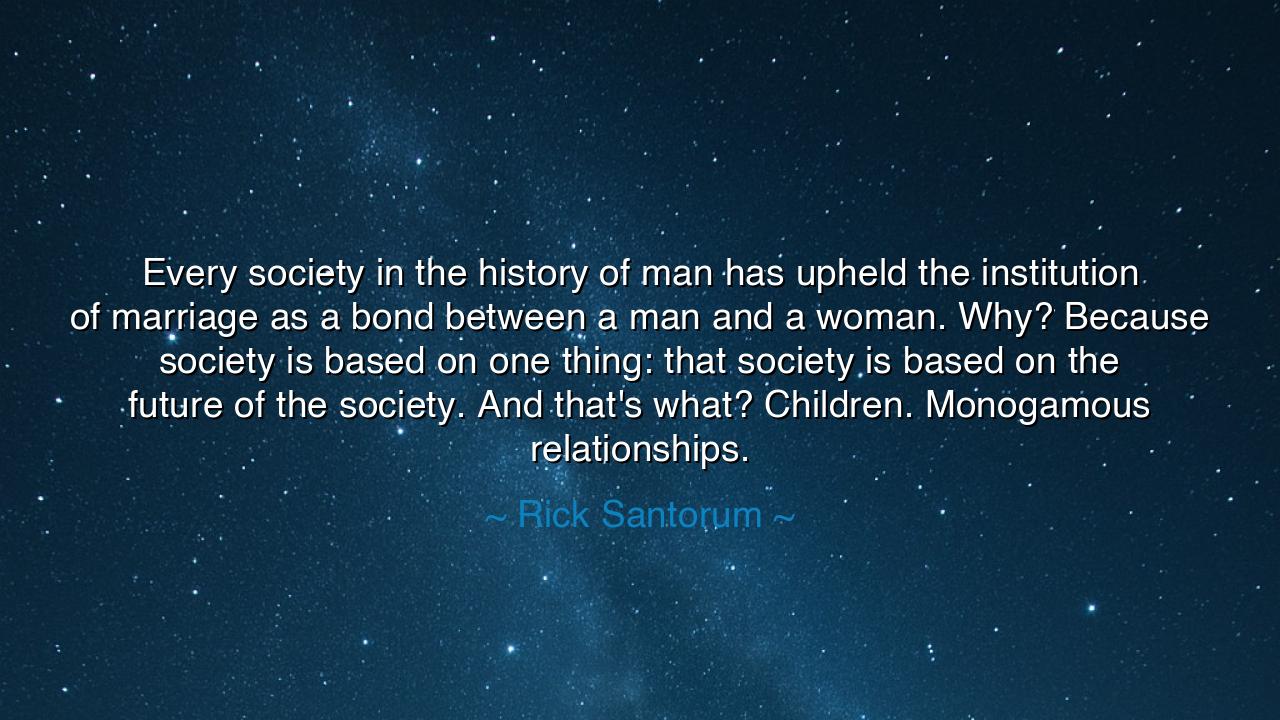
Every society in the history of man has upheld the institution of
Every society in the history of man has upheld the institution of marriage as a bond between a man and a woman. Why? Because society is based on one thing: that society is based on the future of the society. And that's what? Children. Monogamous relationships.






"Every society in the history of man has upheld the institution of marriage as a bond between a man and a woman. Why? Because society is based on one thing: that society is based on the future of the society. And that's what? Children. Monogamous relationships." – Rick Santorum
In these solemn and deliberate words, Rick Santorum, a man of conviction and faith, speaks to what he believes to be the ancient and foundational truth of civilization: that the institution of marriage lies at the heart of human endurance. His declaration, “Every society in the history of man has upheld the institution of marriage as a bond between a man and a woman,” is not merely a defense of tradition — it is a reflection upon the long thread of human history, where the stability of family has been the anchor of nations and the seed of culture. Santorum invokes the wisdom of the ancients, arguing that the family — bound by loyalty, faith, and love — is the womb from which society itself is born.
The origin of this quote arises from a time of cultural and political division, when questions surrounding the definition of marriage stirred fierce debate in the public square. Santorum, speaking from his perspective rooted in both faith and social philosophy, sought to remind his listeners of what he perceived as the unbroken pattern of civilization — that throughout history, the continuity of the human story has depended upon the sacred union between man and woman and the children born of that union. To him, this bond was not merely personal, but civilizational, a structure ordained not only by tradition but by nature itself.
The ancients would have understood this argument well. From the earliest tribes to the great empires, marriage was regarded as more than romance; it was a covenant that united families, preserved bloodlines, and ensured the education and stability of the next generation. The Greeks revered the household as the first school of virtue, where children learned justice, moderation, and piety. The Romans built their republic upon the sanctity of monogamous relationships, believing that the family (familia) was the miniature form of the state itself — where the father guided, the mother nurtured, and the children inherited both duty and faith. When these foundations eroded, so too did the empire. Thus, Santorum’s warning is not new: it is the echo of an age-old truth — that when families fail, nations falter.
Consider the rise and fall of ancient Rome. In its youth, Rome was disciplined, its families bound by duty and fidelity. But as decadence took hold, marriage lost its sacredness, and family life became fractured. Fewer children were born, loyalty waned, and indulgence replaced responsibility. Historians record that as the family unit weakened, the moral and social order began to crumble. Rome did not fall by sword alone — it fell by the slow corrosion of its own foundations. This history illustrates the very essence of Santorum’s warning: that when the bond of family weakens, the strength of civilization itself begins to fade.
Yet, Santorum’s words, while rooted in reverence for the past, also invite reflection upon the present. The modern age, with its shifting values and its emphasis on individual freedom, often forgets that liberty without responsibility leads to fragmentation. In his view, marriage and family are not chains but pillars — the living architecture that gives society shape, meaning, and continuity. He reminds us that civilization is not sustained by policy alone, but by people who love, raise children, and pass on the moral wisdom of their ancestors. In this sense, the future of society truly rests upon the homes of today.
Still, Santorum’s message is not one of condemnation but of remembrance — a call to honor what has long been sacred. Whether one shares his exact definition of marriage or not, his plea for the preservation of family and the cultivation of monogamous commitment speaks to a universal truth: that love and responsibility are inseparable, and that the nurturing of future generations requires not chaos, but order; not impulse, but devotion. The ancients would have said that the home is a temple — and that to keep the fire burning within it is to keep civilization itself alive.
So, my children of the ages, hear this teaching and take it to heart: society is not built in courts or capitals, but in homes. Honor the bonds of your relationships. Cherish fidelity, for it is the soil in which trust and peace grow. Raise your children not only to survive, but to serve — to love, to build, to protect the truth that sustains life. Remember that every generation stands upon the work of the one before it; if you weaken the family, you weaken the bridge to the future.
For as Rick Santorum reminds us, “society is based on the future of the society — and that’s what? Children. Monogamous relationships.” Whether spoken in the halls of government or the chambers of the heart, this truth endures: families are the keepers of the flame of civilization. When that flame burns bright, a nation prospers. When it fades, even the mightiest empires turn to dust. Therefore, guard your families as sacred ground, and in doing so, you will guard the life of the world itself.






AAdministratorAdministrator
Welcome, honored guests. Please leave a comment, we will respond soon